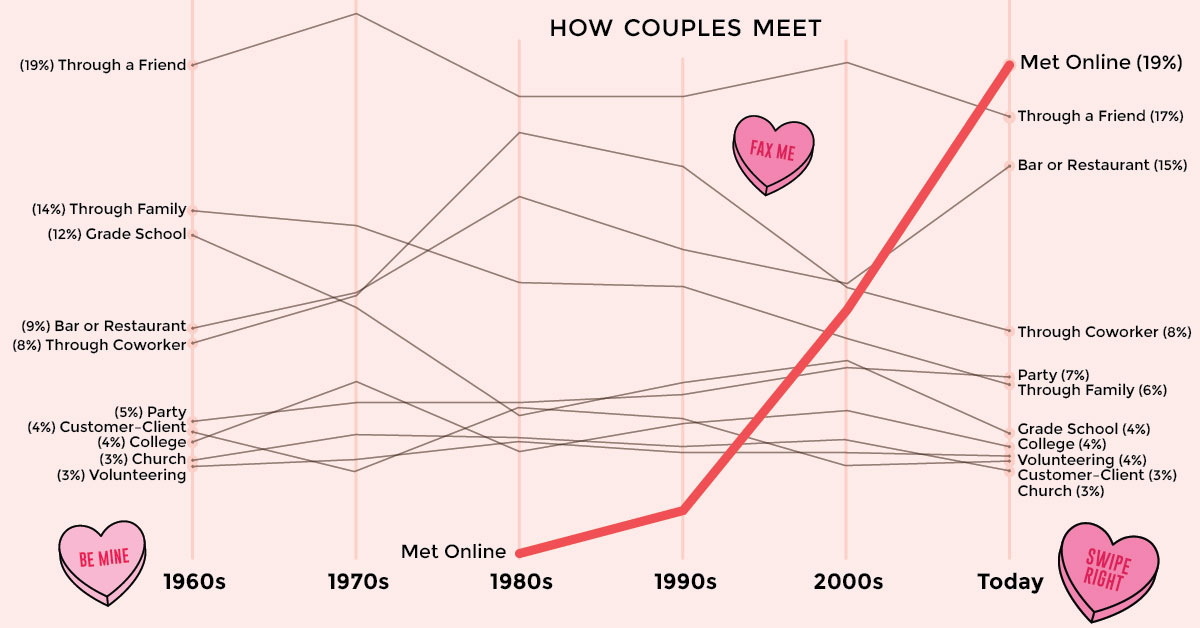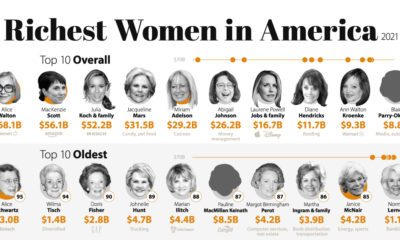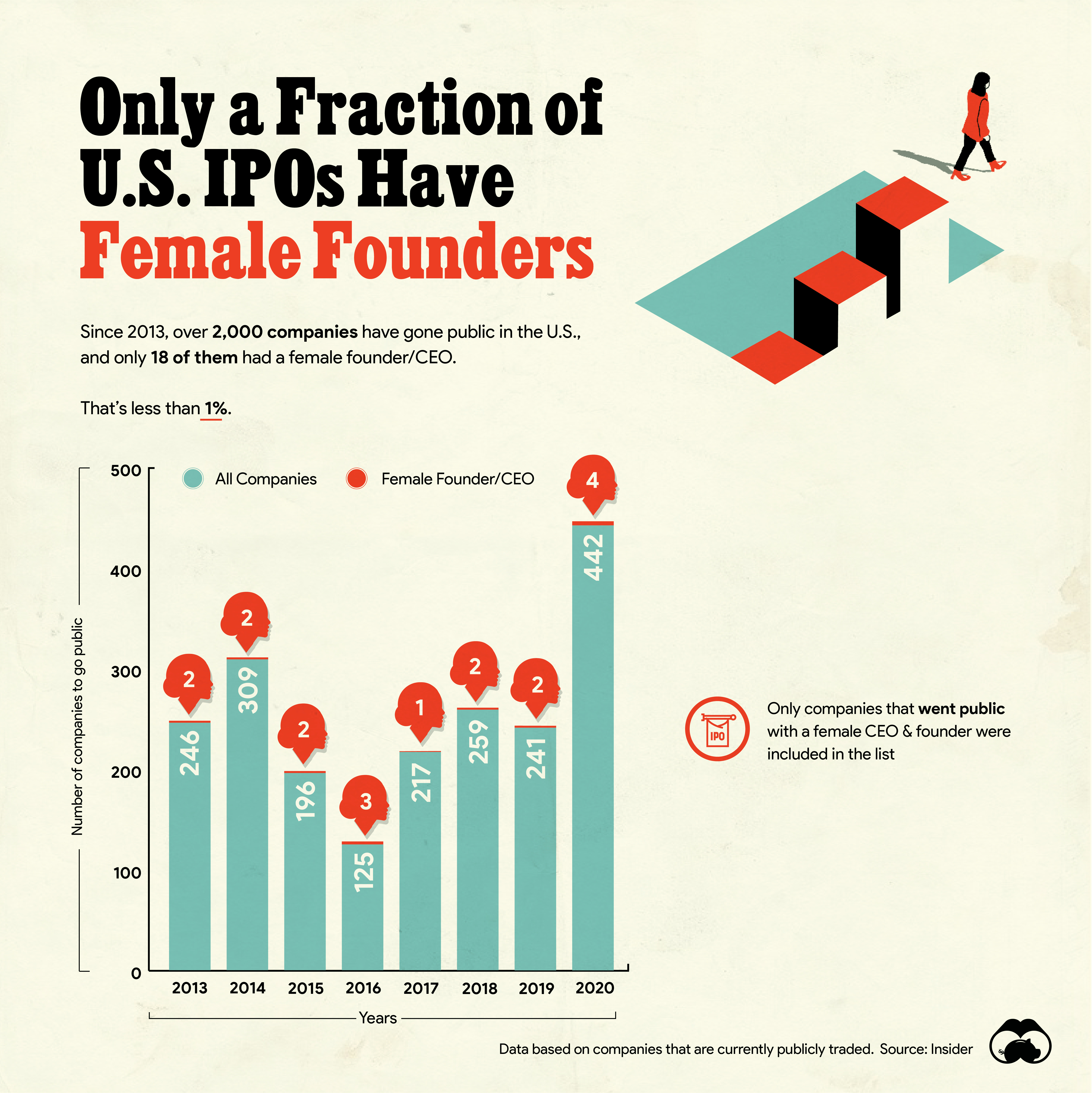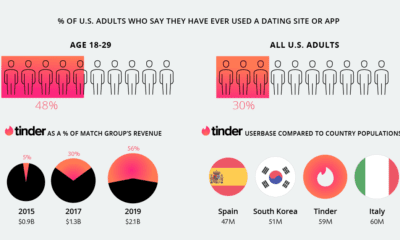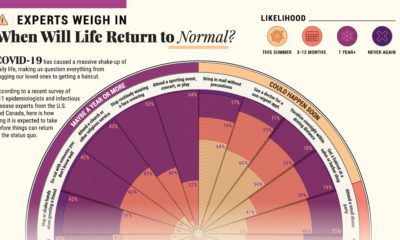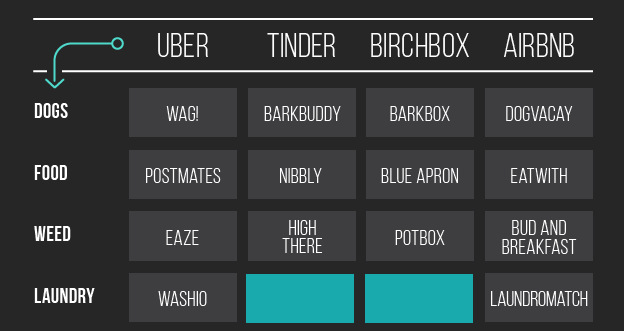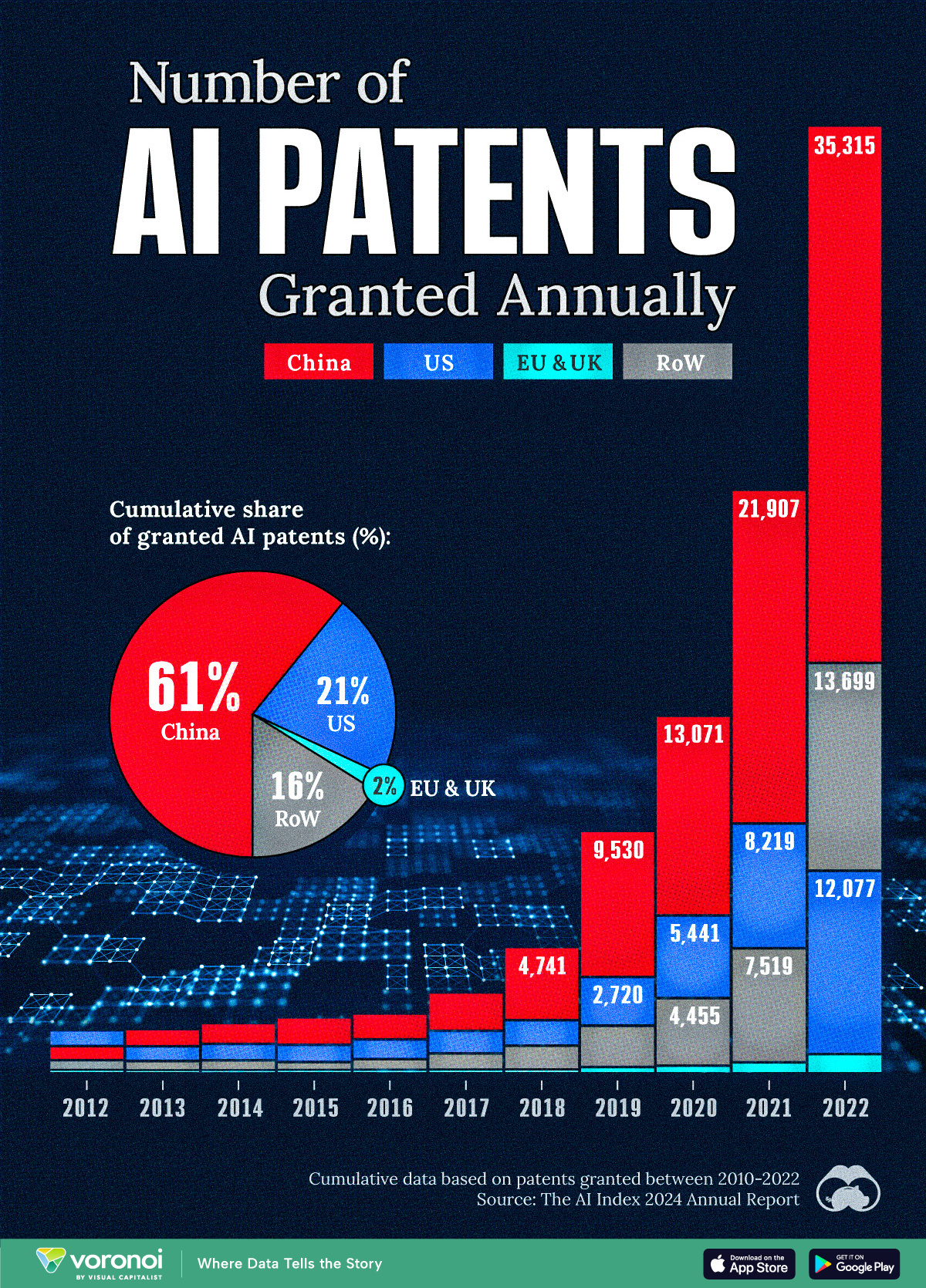Technology
The Rise of Online Dating, and the Company That Dominates the Market
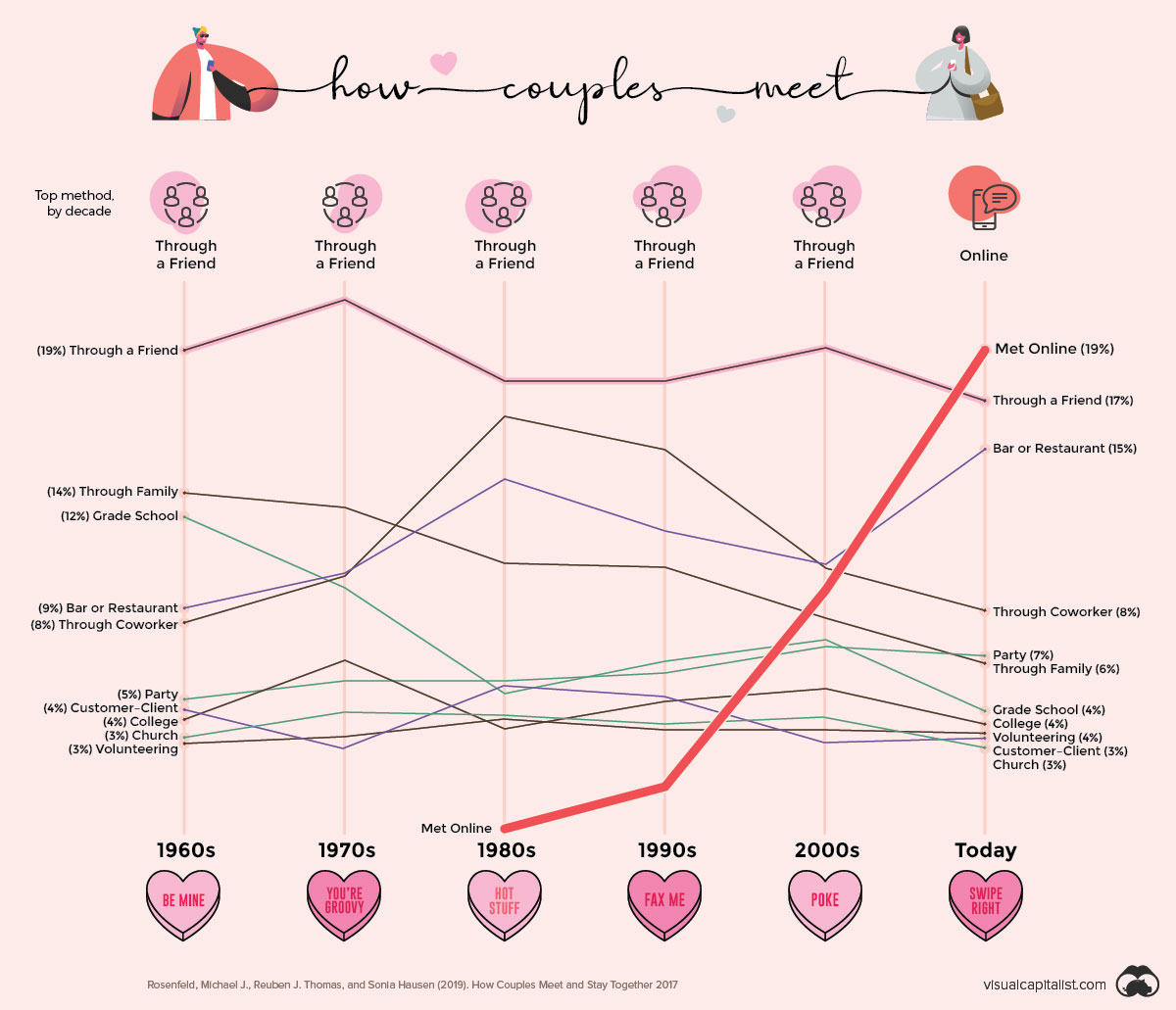
The Rise of Online Dating, and the One Company That Dominates the Market
Couples used to meet in real life, but now more and more people are “matching” online.
While online dating was once considered taboo, the number of couples meeting online has more than doubled in the last decade to about 1-in-5. Nowadays, you’re much more likely to meet your next partner online rather than through your family or co-workers. But don’t worry, your friends are still a good help too.
The data used in today’s chart is from the “How Couples Meet and Stay Together” survey by Stanford University. This unique dataset charts a significant shift in the way couples meet each other, and demonstrates how our changing communication habits are driving massive growth in the online dating market.
The Rise of Dating Apps
The rise of online dating in the last decade goes hand in hand with the rise of dating apps.
Tinder globally popularized app-based matchmaking when it launched on iPhones in 2012, and later on Android in 2013. Unlike traditional dating websites, which required lengthy profiles and complicated profile searches, Tinder gamified online dating with quick account setups and its “swipe-right-to-like” approach. By 2017, Tinder had grown to 57 million active users across the globe and billions of swipes per day.
Since the launch of Tinder, hundreds of dating services have appeared on app stores worldwide. Investors are taking notice of this booming market, while analysts estimate the global online dating market could be worth $12 billion by next year.
But it might surprise you that despite the growing variety of dating options online, most popular apps are owned by just one group.
The Big Business of Dating Apps: Match Group
Today, nearly all major dating apps are owned by the Match Group, a publicly-traded pure play that was spun out of IAC, a conglomerate controlled by media mogul Barry Diller.
IAC saw the online dating trend early, purchasing early online dating pioneer Match.com way back in 1999. However, with online dating shifting into the mainstream over recent years, the strategy quickly shifted to aggressively buying up major players in the market.
We’re highly acquisitive, and we’re always talking to companies. If you want to sell, you should be talking to us.
–Mandy Ginsberg, Match Group CEO
In addition to its prized app Tinder – which doubled its revenue in 2018 to $805 million – Match Group owns popular online dating services like OkCupid, Plenty of Fish, Hinge, and has even bought out international competitors like Meetic in Europe, and Eureka in Japan. The dating giant reported revenues of $1.73 billion in 2018.
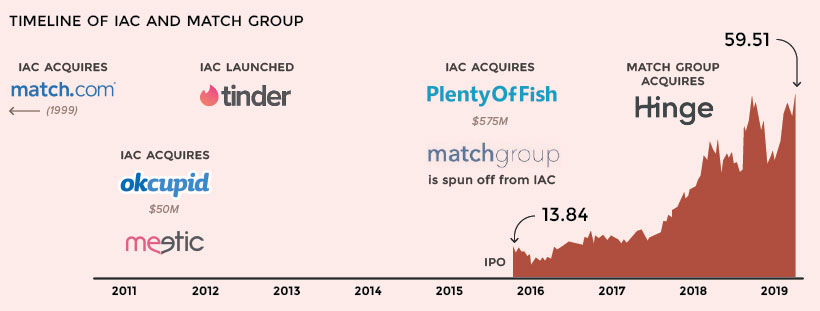
According to reports, Match Group now owns more than 45 dating-related businesses, including 25 acquisitions.
As Match Group continues to swallow up the online dating market, it now boasts dating sites or apps in every possible niche – including the four most-used apps in the United States.
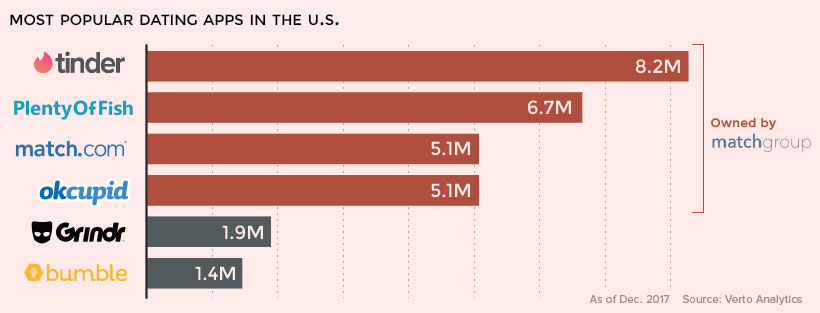
Despite Match Group’s dominant efforts, there are still two competitors that remain outside the dating giant’s reach.
The One That Got Away
In 2017, Match Group tried to acquire its last major competitor, Bumble – which had grown to over 23 million users in just three years – for $450 million. Bumble rejected the offer and by the next year, Match Group sued Bumble for patent infringement, for what some felt was a bargaining chip to force an acquisition.
Bumble responded with an ad in the Dallas Morning News denouncing Match Group: “We swipe left on your multiple attempts to buy us, copy us, and, now, to intimidate us. We’ll never be yours. No matter the price tag, we’ll never compromise our values.”
It remains to be seen if Match Group will be able to acquire Bumble, but another tech giant’s decision to launch its own dating service has also complicated Match’s conquest of the online dating market.
New Face in Town
In 2018, social media giant Facebook launched its own dating service—potentially leveraging its 2.2 billion active users—to join the online dating market.
While the announcement initially caused Match Group’s stock to drop 21%, it since has rebounded as Facebook has been slow to roll out their service.
Going forward, Match Group’s dominance may be hindered by anti-trust calls in the U.S., Bumble’s growth and direct competition to Tinder, and whether the sleeping giant Facebook can change the global online dating market with its own service.
Who will win our hearts?
Hat tip to Nathan Yau at Flowing Data, who introduced us to the data on how couples meet. His dynamic chart is worth a look as well.
Technology
Visualizing AI Patents by Country
See which countries have been granted the most AI patents each year, from 2012 to 2022.
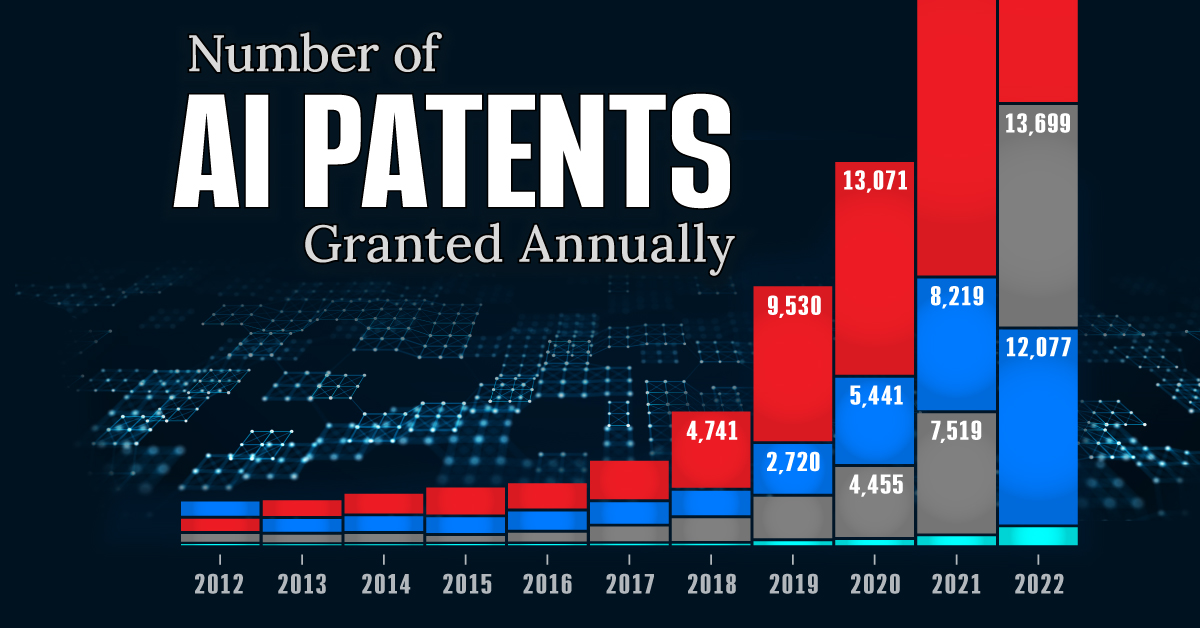
Visualizing AI Patents by Country
This was originally posted on our Voronoi app. Download the app for free on iOS or Android and discover incredible data-driven charts from a variety of trusted sources.
This infographic shows the number of AI-related patents granted each year from 2010 to 2022 (latest data available). These figures come from the Center for Security and Emerging Technology (CSET), accessed via Stanford University’s 2024 AI Index Report.
From this data, we can see that China first overtook the U.S. in 2013. Since then, the country has seen enormous growth in the number of AI patents granted each year.
| Year | China | EU and UK | U.S. | RoW | Global Total |
|---|---|---|---|---|---|
| 2010 | 307 | 137 | 984 | 571 | 1,999 |
| 2011 | 516 | 129 | 980 | 581 | 2,206 |
| 2012 | 926 | 112 | 950 | 660 | 2,648 |
| 2013 | 1,035 | 91 | 970 | 627 | 2,723 |
| 2014 | 1,278 | 97 | 1,078 | 667 | 3,120 |
| 2015 | 1,721 | 110 | 1,135 | 539 | 3,505 |
| 2016 | 1,621 | 128 | 1,298 | 714 | 3,761 |
| 2017 | 2,428 | 144 | 1,489 | 1,075 | 5,136 |
| 2018 | 4,741 | 155 | 1,674 | 1,574 | 8,144 |
| 2019 | 9,530 | 322 | 3,211 | 2,720 | 15,783 |
| 2020 | 13,071 | 406 | 5,441 | 4,455 | 23,373 |
| 2021 | 21,907 | 623 | 8,219 | 7,519 | 38,268 |
| 2022 | 35,315 | 1,173 | 12,077 | 13,699 | 62,264 |
In 2022, China was granted more patents than every other country combined.
While this suggests that the country is very active in researching the field of artificial intelligence, it doesn’t necessarily mean that China is the farthest in terms of capability.
Key Facts About AI Patents
According to CSET, AI patents relate to mathematical relationships and algorithms, which are considered abstract ideas under patent law. They can also have different meaning, depending on where they are filed.
In the U.S., AI patenting is concentrated amongst large companies including IBM, Microsoft, and Google. On the other hand, AI patenting in China is more distributed across government organizations, universities, and tech firms (e.g. Tencent).
In terms of focus area, China’s patents are typically related to computer vision, a field of AI that enables computers and systems to interpret visual data and inputs. Meanwhile America’s efforts are more evenly distributed across research fields.
Learn More About AI From Visual Capitalist
If you want to see more data visualizations on artificial intelligence, check out this graphic that shows which job departments will be impacted by AI the most.
-
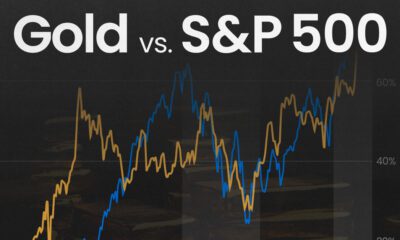
 Mining1 week ago
Mining1 week agoGold vs. S&P 500: Which Has Grown More Over Five Years?
-

 Markets2 weeks ago
Markets2 weeks agoRanked: The Most Valuable Housing Markets in America
-

 Money2 weeks ago
Money2 weeks agoWhich States Have the Highest Minimum Wage in America?
-

 AI2 weeks ago
AI2 weeks agoRanked: Semiconductor Companies by Industry Revenue Share
-

 Markets2 weeks ago
Markets2 weeks agoRanked: The World’s Top Flight Routes, by Revenue
-

 Countries2 weeks ago
Countries2 weeks agoPopulation Projections: The World’s 6 Largest Countries in 2075
-

 Markets2 weeks ago
Markets2 weeks agoThe Top 10 States by Real GDP Growth in 2023
-

 Demographics2 weeks ago
Demographics2 weeks agoThe Smallest Gender Wage Gaps in OECD Countries
